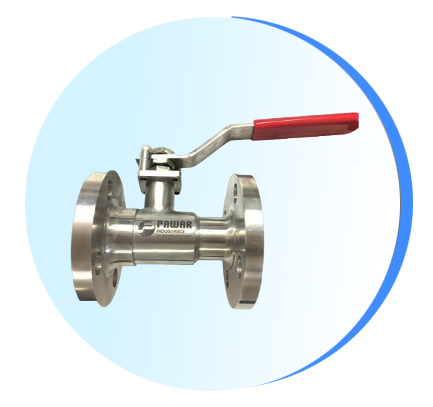
Pawar Industries is leading Manufacturers in Single Piece Ball Valves
Single piece ball valves are essential components used in industrial applications to regulate and control the flow of fluids and gases. These valves offer reliable and efficient flow control, making them a popular choice in various industries. In this comprehensive guide, we will explore the working principles, advantages, applications, and maintenance considerations of single piece ball valves. Whether you are an engineer, technician, or someone interested in fluid control systems, this article will provide valuable insights into the functionality and benefits of single piece ball valves.
Working Principles of Single Piece Ball Valves -
Single piece ball valves operate based on the principle of a rotating ball with a bore in the center that controls the flow of fluid or gas. These valves consist of a one-piece body, a ball with a bore, seals, and an actuator mechanism.
When the valve is in the open position, the ball is rotated by the actuator, aligning the bore with the flow path and allowing fluid or gas to pass through. When the valve is closed, the ball is rotated to block the flow path, providing a secure shut-off.
Single piece ball valves offer advantages such as low torque operation, quick actuation, and reliable sealing. They provide excellent flow characteristics, minimal pressure drop, and reliable shut-off in both high and low-pressure applications.
Advantages of Single Piece Ball Valves -
Single piece ball valves offer numerous advantages, making them a preferred choice in industrial applications that require reliable flow control. Some key advantages include:
a) Quick Actuation : Single piece ball valves provide rapid actuation, allowing for fast response times and precise control over fluid or gas flow. This is particularly beneficial in applications that require quick adjustments to maintain process stability and control.
b) Low Torque Operation : These valves offer low torque operation, making them easy to open and close even in high-pressure systems. This reduces the need for excessive actuator force, leading to improved energy efficiency and extended actuator life.
c) Excellent Flow Characteristics : Single piece ball valves provide excellent flow characteristics with minimal pressure drop. The full-bore design allows for unobstructed flow, minimizing turbulence and maximizing flow efficiency.
d) Reliable Sealing : Single piece ball valves feature reliable sealing mechanisms, ensuring tight shut-off and preventing leakage when the valve is closed. This provides enhanced safety and minimizes the risk of product loss or environmental impact.
e) Versatility : Single piece ball valves are versatile and can handle a wide range of fluids and gases, including corrosive and abrasive media. They are suitable for various industries, including oil and gas, chemical processing, water treatment, and HVAC systems.
Applications of Single Piece Ball Valves -
Single piece ball valves find applications in diverse industries where reliable flow control is essential. Some common applications include:
a) Oil and Gas Industry : Single piece ball valves are widely used in oil and gas production, refining, and distribution systems. They provide reliable shut-off, efficient flow control, and excellent resistance to harsh operating conditions.
b) Chemical Processing : Single piece ball valves play a vital role in chemical processing plants, where they regulate the flow of chemicals, acids, and corrosive fluids. They ensure precise control and reliable shut-off, contributing to process efficiency and safety.
c) Water and Wastewater Treatment : Single piece ball valves are employed in water and wastewater treatment plants to control the flow of liquids and gases during treatment processes. They offer reliable shut-off, efficient flow control, and excellent resistance to water and wastewater conditions.
d) HVAC Systems : Single piece ball valves are utilized in heating, ventilation, and air conditioning systems for fluid control and isolation. They ensure reliable shut-off, efficient flow control, and excellentresistance to temperature variations, making them suitable for HVAC applications.
e) Pharmaceutical Industry : Single piece ball valves are used in pharmaceutical manufacturing processes for precise control of fluid flow in various applications, such as ingredient transfer, formulation, and sterile processing. They provide reliable shut-off and minimize the risk of contamination.
f) Food and Beverage Industry : Single piece ball valves play a crucial role in the food and beverage industry, where they regulate the flow of ingredients, beverages, and other fluids. They offer reliable shut-off, ease of cleaning, and compliance with hygiene standards.
Maintenance Considerations for Single Piece Ball Valves -
Proper maintenance of single piece ball valves is essential to ensure their optimal performance and longevity. Here are some important maintenance considerations:
a) Regular Inspection : Conduct routine inspections to check for signs of wear, corrosion, or damage to the valve body, ball, seals, and other components. Replace any worn or damaged parts promptly to maintain efficient operation.
b) Lubrication : Ensure proper lubrication of the valve stem, ball, and seals as recommended by the manufacturer. Lubrication helps reduce friction, ensures smooth operation, and extends the valve's lifespan.
c) Leakage Prevention : Regularly check for any leaks around the valve body, stem, or seals. Address any leakage promptly to prevent product loss, system inefficiencies, and safety hazards.
d) Actuator Maintenance : If the single piece ball valve is equipped with an actuator, inspect and maintain the actuator components as per the manufacturer's recommendations. This may include checking the condition of seals, lubricating moving parts, and verifying proper actuator response to control signals.
e) Cleaning and Flushing : Regularly clean the valve internals and flush the system to remove any accumulated debris, sediment, or contaminants. This helps maintain optimal performance, prevent blockages, and ensure proper sealing.
f) Training and Documentation : Ensure that personnel responsible for maintaining single piece ball valves receive proper training on maintenance procedures. Keep detailed records of maintenance activities, including inspection dates, repairs, and replacements, to track the valve's performance history.


